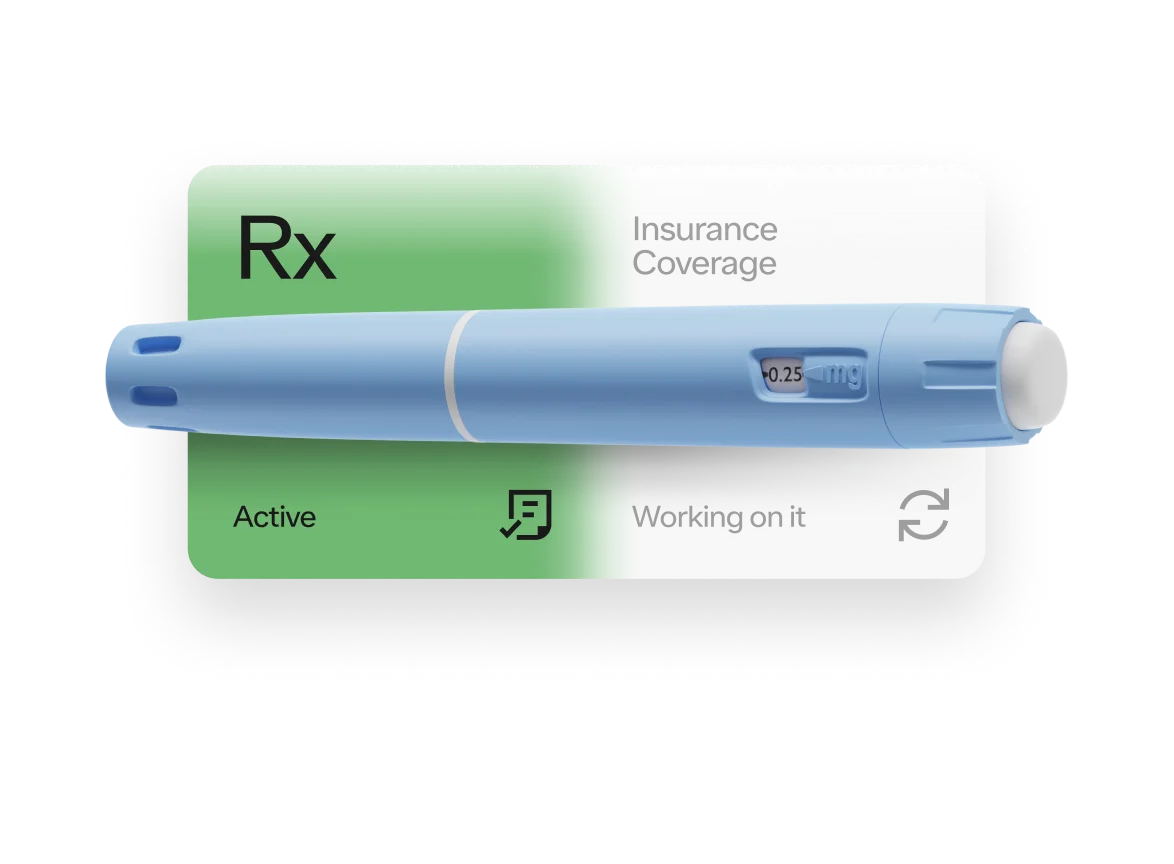Key takeaways
Ozempic works in the brain by targeting areas that control hunger, which helps reduce appetite and support weight loss.
It may also make the brain more responsive to hormones that signal when you’ve eaten enough.
Most large studies have not found an increase in risks like depression, dementia, or other brain-related issues.
Early research suggests Ozempic could even protect memory and thinking skills, but more long-term studies are needed.
Here's what we'll cover
Here's what we'll cover
Here's what we'll cover
Key takeaways
Ozempic works in the brain by targeting areas that control hunger, which helps reduce appetite and support weight loss.
It may also make the brain more responsive to hormones that signal when you’ve eaten enough.
Most large studies have not found an increase in risks like depression, dementia, or other brain-related issues.
Early research suggests Ozempic could even protect memory and thinking skills, but more long-term studies are needed.
If you’ve ever wished you could “switch off” constant hunger, Ozempic (semaglutide) and other GLP-1 medications for weight loss may be the answer you’ve heard about. By acting on the brain’s appetite centers, it helps send signals that tell you you’re full sooner — so you can eat less without feeling deprived.
Researchers are still studying what Ozempic does to your brain, including how it may affect appetite, mood, and memory.
What Ozempic does to your brain
Research shows that Ozempic works on multiple pathways in the brain to regulate hunger and fullness. These are some of the most studied Ozempic brain effects:
GLP-1 receptor agonists like Ozempic strengthen your brain’s “fullness” signals: It activates receptors in areas of the brain that control hunger, like the hypothalamus and brainstem. This makes the brain more responsive to satiety cues and helps you feel satisfied sooner after eating.
It helps keep appetite in balance: By mimicking the body’s natural GLP-1 hormone, Ozempic can help reduce overeating and support healthier eating habits. People who take Ozempic usually notice appetite changes within the first few weeks of starting the medication.
It works with your digestion: Ozempic slows down how quickly food leaves the stomach and changes how full the stomach feels after a meal. These signals travel through the nerves in your gut to a brain area that processes appetite, which helps reinforce the feeling of satiety.
Ozempic helps your brain respond better to satiety hormones: GLP-1 medications help the brain respond better to satiety hormones such as leptin. This hormone helps regulate your appetite by sending signals to the brain when you’re full.
Potential Ozempic cognitive effects
A 2024 study drew from records covering over 100 million patients to compare Ozempic with three other diabetes drugs, with the goal of looking at Ozempic’s neurological side effects and benefits. Here’s what it found:
No sign of higher brain health risks
The study found that people taking Ozempic did not have a higher risk of brain or mental health-related concerns compared to those on other diabetes medicines. This study looked at conditions such as depression, anxiety, psychosis, seizures, and dementia.
Lower risk of memory and thinking issues
The study also found that people prescribed Ozempic were about 28% less likely to be diagnosed with cognitive deficits compared to those taking the diabetes medications sitagliptin or glipizide.
The same study also suggested a lower risk of dementia compared to sitagliptin. However, because this was a retrospective analysis rather than a randomized trial, the findings may be influenced by other factors. More long-term human studies are needed before drawing firm conclusions.
Possible link with migraines
The only area where a negative signal appeared was with migraines. In the study, people on Ozempic had a slightly higher chance of being diagnosed with migraines compared to those on glipizide. This result wasn’t consistent across all drug comparisons, so more evidence is needed about whether Ozempic is linked to migraines.
Reduction in addictive behaviors
In the study mentioned above, people who were prescribed Ozempic had a lower risk of nicotine misuse compared to glipizide, empagliflozin, and sitagliptin.
A 26-week clinical trial tested the GLP-1 drug exenatide in people with alcohol use disorder. Overall, the drug didn’t significantly reduce heavy drinking compared with placebo.
But brain scans revealed an interesting finding: people on exenatide showed less activity in brain regions linked to craving and reward when exposed to alcohol cues. A subgroup of participants with obesity did report fewer heavy drinking days and lower total alcohol intake.
Researchers say these findings suggest GLP-1 drugs may play a role in treating addictive behaviors, but it’s too soon to reliably tell.
It’s worth noting that the findings above come from larger-scale research, but evidence on other brain-related effects is far more limited. The points below are drawn from smaller studies, case reports, and personal accounts, so they should be seen as anecdotal rather than proven risks.
Brain fog and cognitive issues
You may have heard some Ozempic users on social media talk about “Ozempic brain” or feeling foggy or less clear-headed after starting the medication. But there’s no strong scientific evidence that Ozempic directly causes brain fog.
These experiences may instead be related to early side effects like low blood sugar, dehydration, fatigue, or reduced calorie intake. Because these factors can affect focus and memory on their own, it’s difficult to know whether the drug itself plays a direct role.
Mood changes
Some people also report mood swings or a loss of focus or interest in usual activities while taking Ozempic. Online, this is sometimes described as “Ozempic personality.” These reports are anecdotal, not an official medical diagnosis, and studies so far haven’t confirmed a consistent pattern.
Mental fatigue
Tiredness or mental fatigue is another complaint some people share while on Ozempic. Like brain fog and mood changes, this hasn’t been established as a direct effect of the medication.
Instead, it may be connected to broader shifts like lower food intake, fatigue, or other side effects.
Does Ozempic cause personality changes or mood swings?
Ozempic hasn’t been proven to cause personality changes. Mood shifts, irritability, anxiety, or depression are not listed as common side effects. However, some patients have reported feeling these symptoms after starting the medication. More research is needed about whether GLP-1 medications like Ozempic could affect mood and personality.
Here’s what’s known so far:
A large population study found a higher risk of certain conditions: A community-based study of more than 160,000 patients with obesity found that those prescribed GLP-1 medications (including semaglutide and liraglutide) had a higher risk of developing psychiatric conditions such as anxiety and depression compared to people not taking these drugs. The authors stress the need for careful patient monitoring and further research.
Social media reports are mixed: An analysis of Reddit, TikTok, and YouTube posts found that some people on Ozempic and similar drugs reported anxiety, depression, or insomnia, while others described mood improvements. These are personal reports, not controlled scientific evidence, but they highlight that people’s experiences can vary.
Personality changes aren’t proven: Scientific studies don’t show that Ozempic causes personality changes. While the phrase “Ozempic Personality” has appeared in online conversations, it’s not a recognized medical effect.
Researchers are still studying whether Ozempic can cause mood swings, and so far, there are no clear conclusions.
Are there long-term brain effects from taking Ozempic?
There isn’t much long-term data yet on the brain effects from taking Ozempic. Most of the evidence available only follows people for 1–2 years. Long-term research on Ozempic and brain health is still limited, and early evidence paints a complex picture.
Some research suggests there may be a higher risk of psychiatric conditions like depression or anxiety in certain groups, while other studies haven’t found a strong correlation.
Some findings suggest that Ozempic may have protective effects on the brain, as previously mentioned. People taking GLP-1 medicines, including semaglutide, have been shown to have lower rates of cognitive decline and dementia compared to some other diabetes drugs.
In a large population-based study, those taking GLP-1 receptor agonists had lower rates of Parkinson’s compared to people using other oral diabetes drugs.
An electronic database study looked at the risk of Alzheimer’s diagnosis for people who took Ozempic compared to other diabetes medications. People who were prescribed Ozempic had a lower risk of Alzheimer’s diagnosis, but further clinical trials are needed to confirm these findings.
All of this suggests semaglutide could potentially protect against diseases like Alzheimer’s and Parkinson’s. Still, these benefits have mostly been seen in observational studies (versus clinical trials), so more long-term and robust studies are needed.
Bottom line: what does Ozempic do to your brain?
Ozempic’s brain effects extend beyond weight management, but most are related to how the drug helps regulate appetite and increase feelings of fullness. Available evidence doesn’t show major risks for brain health, though individual experiences can vary. Here are the main points to remember about what Ozempic does to your brain:
Appetite regulation is the primary brain effect: By acting on GLP-1 receptors in the hypothalamus and brainstem, Ozempic improves satiety signals, reduces hunger, and makes the brain more responsive to hormones that control eating.
Neurological risks appear low overall: Large population studies show no increased risk of depression, dementia, or other psychiatric conditions compared to other diabetes drugs.
Mood and cognitive changes are possible but uncommon: While not listed as standard Ozempic side effects, isolated reports link semaglutide to depression or emotional changes.
Potential long-term brain benefits are under study: Early research hints that GLP-1 drugs may help protect against conditions like Alzheimer’s or Parkinson’s, but these effects are still mostly seen in observational studies, and clinical trials are needed to confirm these links.
If you’re using Ozempic, be aware of possible mood or cognitive changes and discuss any concerns with your healthcare provider. Overall, however, current evidence suggests Ozempic is safe for brain health.
Frequently asked questions (FAQs)
Can Ozempic cause confusion?
No, confusion is not a documented side effect of Ozempic. The drug primarily works by activating GLP-1 receptors in areas of the brain that regulate hunger and fullness, such as the hypothalamus and brainstem, not areas tied to confusion.
Can Ozempic make anxiety worse?
No clear evidence shows that Ozempic makes anxiety worse. Some people have shared personal reports of mood changes, but in research studies, the main documented brain effects are tied to appetite signals, not anxiety pathways.
Should I stop Ozempic if I have brain fog?
Yes, you might need to stop Ozempic if you experience brain fog or other unexpected symptoms while taking it. But it’s important to talk to your healthcare provider, as they can help determine if the symptoms are related to the medication or to something else.
What hormones does Ozempic send to the brain?
Ozempic mimics the natural hormone GLP-1. GLP-1 receptors in the brain help regulate hunger and fullness by boosting satiety signals. This includes activating neurons in the brainstem, modulating neurotransmitters like serotonin and glutamate, and improving the brain’s response to leptin, another hormone involved in appetite control.
DISCLAIMER
If you have any medical questions or concerns, please talk to your healthcare provider. The articles on Health Guide are underpinned by peer-reviewed research and information drawn from medical societies and governmental agencies. However, they are not a substitute for professional medical advice, diagnosis, or treatment.
Ozempic Important Safety Information: Read more about serious warnings and safety info.
GLP-1 Important Safety Information: Read more about serious warnings and safety info.
References
Arillotta, D., Floresta, G., Guirguis, A., et al. (2023). GLP-1 Receptor Agonists and Related Mental Health Issues; Insights from a Range of Social Media Platforms Using a Mixed-Methods Approach. Brain Sciences, 13(11), 1503. doi: 10.3390/brainsci13111503. Retrieved from https://pmc.ncbi.nlm.nih.gov/articles/PMC10669484/
Brauer, R., Wei, L., Ma, T., et al. (2020). Diabetes medications and risk of Parkinson's disease: a cohort study of patients with diabetes. Brain: A Journal of Neurology, 143(10), 3067–3076. doi: 10.1093/brain/awaa262. Retrieved from https://pubmed.ncbi.nlm.nih.gov/33011770/
De Giorgi, R., Koychev, I., Adler, A. I., et al. (2024). 12-month neurological and psychiatric outcomes of semaglutide use for type 2 diabetes: A propensity-score matched cohort study. eClinicalMedicine, 72, 102726. doi: 10.1016/j.eclinm.2024.102726. Retrieved from https://pmc.ncbi.nlm.nih.gov/articles/PMC11701436/
Klausen, M. K., Jensen, M. E., Møller, M., et al. (2022). Exenatide once weekly for alcohol use disorder investigated in a randomized, placebo-controlled clinical trial. JCI Insight, 7(19), e159863. doi: 10.1172/jci.insight.159863. Retrieved from https://pubmed.ncbi.nlm.nih.gov/36066977/
Kornelius, E., Huang, J. Y., Lo, S. C., et al. (2024). The risk of depression, anxiety, and suicidal behavior in patients with obesity on glucagon like peptide-1 receptor agonist therapy. Scientific Reports, 14(1), 24433. doi: 10.1038/s41598-024-75965-2. Retrieved from https://pubmed.ncbi.nlm.nih.gov/39424950/
Moiz, A., Filion, K. B., Tsoukas, M. A., et al. (2025). Mechanisms of GLP-1 Receptor Agonist-Induced Weight Loss: A Review of Central and Peripheral Pathways in Appetite and Energy Regulation. The American Journal of Medicine, 138(6), 934–940. doi: 10.1016/j.amjmed.2025.01.021. Retrieved from https://www.amjmed.com/article/S0002-9343(25)00059-2/fulltext
Shah, M. & Vella, A. (2014). Effects of GLP-1 on appetite and weight. Reviews in Endocrine & Metabolic Disorders, 15(3), 181–187. doi: 10.1007/s11154-014-9289-5. Retrieved from https://pmc.ncbi.nlm.nih.gov/articles/PMC4119845/
TODAY. (2025). What is ‘Ozempic personality’? Users report changes in mood. Retrieved from https://www.today.com/video/does-taking-ozempic-affect-your-personality-and-habits-209953861708
U.S. Food & Drug Administration (FDA). (2025). Highlights of Prescribing Information: Ozempic (semaglutide) injection, for subcutaneous use. Retrieved from https://www.accessdata.fda.gov/drugsatfda_docs/label/2025/209637s025lbl.pdf
Wang, W., Wang, Q., Qi, X., et al. (2024). Associations of semaglutide with first-time diagnosis of Alzheimer's disease in patients with type 2 diabetes: Target trial emulation using nationwide real-world data in the US. Alzheimer's & Dementia : The Journal of the Alzheimer's Association, 20(12), 8661–8672. doi: 10.1002/alz.14313. Retrieved from https://pubmed.ncbi.nlm.nih.gov/39445596/














